Gun violence can affect someone’s health in more ways than just the physical damage, even including those who were not directly involved in the violence. Our providers here at Family First Health have experienced firsthand how gun violence can take a toll on someone from some of their patients.
Those experiences, whether witnessing a murder, being held at gunpoint, or just living on a street where there’s gun violence affect someone’s day to day living and have daily struggles well beyond when the violence took place. After witnessing the murder of a parent, a patient’s struggles of PTSD, depression, and substance dependence became a daily obstacle and is still an obstacle to this day, 15-20 years after it took place.
Other patients who experienced the death of a loved one or just having gun violence on their block often experience significant clinical depression, feelings of shame and guilt, anxiety, and social isolation which become barriers to addressing their biopsychosocial needs.
One provider has dealt with multiple 15 year old patients who have been caught in the crossfire of gun violence having to remove bullet fragments from a patient’s back and another patient now not being able to see out of one eye after bullets going through their head, arm, and leg.
Gun violence is not just subjected to adults as they have seen teenagers who have been caught up in gun violence. A younger patient, scared about gun violence, reported that they had a gun hidden away in their backpack in case of an intruder breaking into the school.
Hear from some of our providers on how exposure to gun violence increases a patient’s lifelong health issues:
Dr. Luis Garcia, MD, George Street Center: “Increased levels of exposure to gun violence increase the level of stress which results in high risk of depression, anxiety, cardiovascular disease, diabetes, obesity, and much more.”
Christina Little, LPC, George Street Center: “Exposure to gun violence can shatter a person’s sense of safety which has large rippling effects on how a person goes through and experiences life, trusts in others, and the person’s ability to allow the level of vulnerability needed to ask for help and support.”
Helen Madea, LCSW, George Street and Lebanon Center: “It keeps their system in fight or flight, making it difficult to regulate their emotions and problem solve basic needs.”
The effects of gun violence are real, and take a heavy toll, physically and mentally, on those affected, either having been a direct victim or witness. Understanding these tolls helps our providers give the best possible care to those affected by gun violence in our communities.
